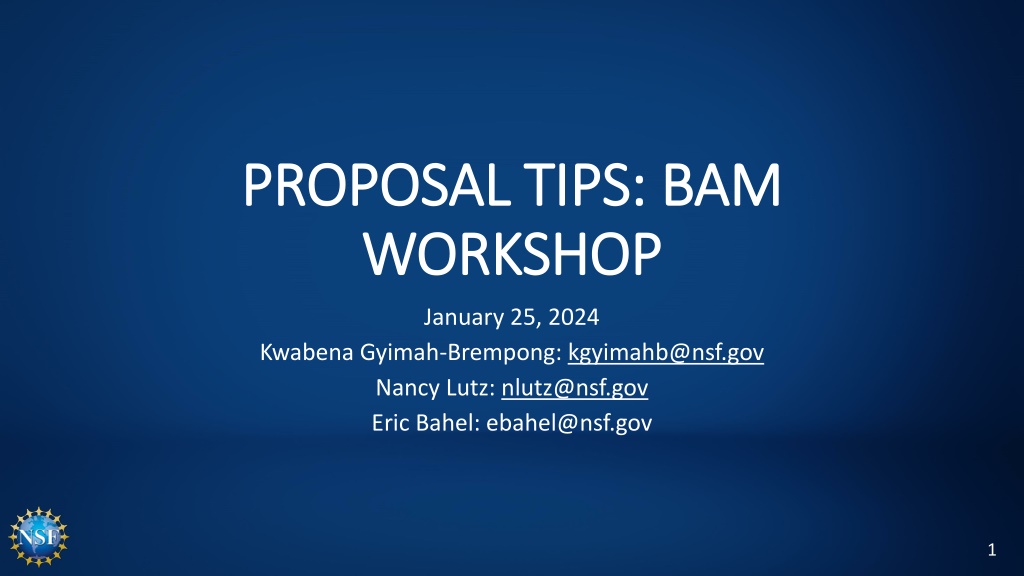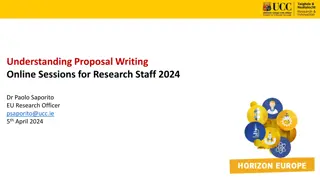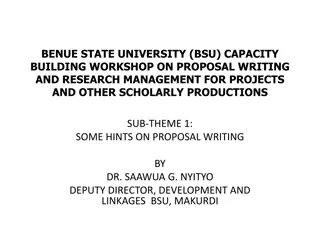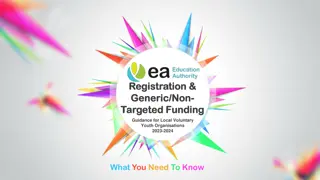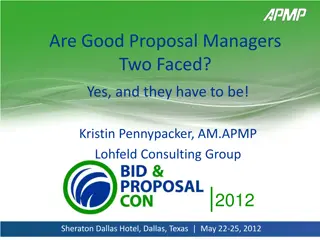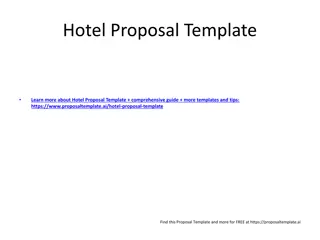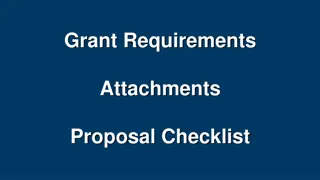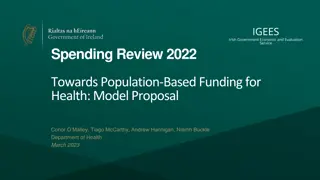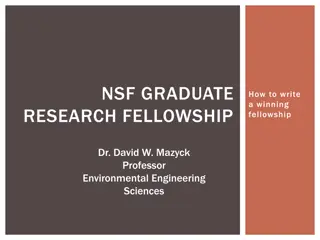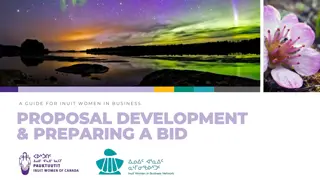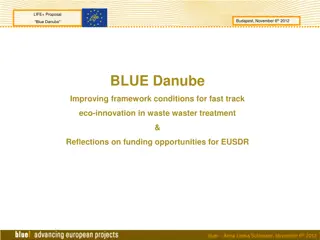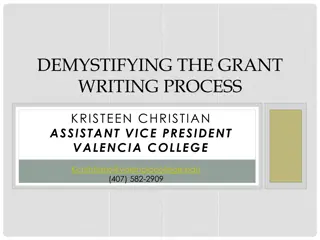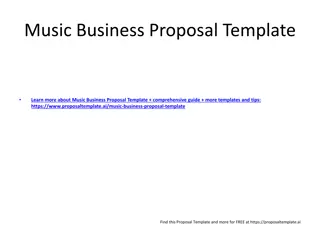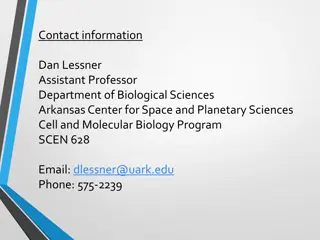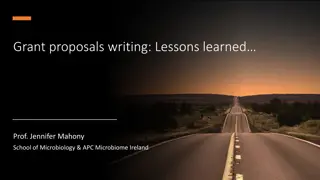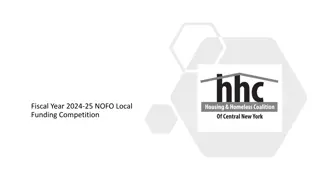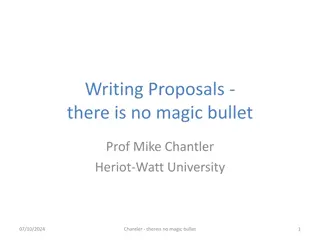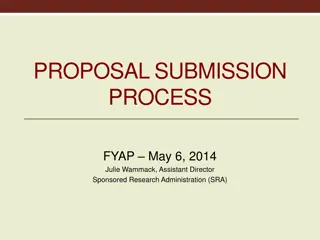Effective Proposal Writing Techniques for Successful Funding
Writing a competitive proposal for funding requires careful planning and understanding. Know your reasons for applying, understand the target organization's mission, and aim for the project's sweet spot. Pay attention to the details and start early to increase your chances of success.
Download Presentation

Please find below an Image/Link to download the presentation.
The content on the website is provided AS IS for your information and personal use only. It may not be sold, licensed, or shared on other websites without obtaining consent from the author. Download presentation by click this link. If you encounter any issues during the download, it is possible that the publisher has removed the file from their server.
E N D
Presentation Transcript
PROPOSAL TIPS: BAM PROPOSAL TIPS: BAM WORKSHOP WORKSHOP January 25, 2024 Kwabena Gyimah-Brempong: kgyimahb@nsf.gov Nancy Lutz: nlutz@nsf.gov Eric Bahel: ebahel@nsf.gov 1
Economics Program Economics Program Program Officers: Nancy Lutz Kwabena Gyimah-Brempong kgyimahb@nsf.gov Eric Bahel ebahel@nsf.gov Best way to reach us by email. Be sure to send us 1-2-page summary ahead so we can have productive conversations. Funds research in all subfields of economics: Full Proposals, DDRIG, CAREERs, Conferences, Data Collection. Co-review with other programs Target Dates: January 18 and August 18 each year. nlutz@nsf.gov 2
OTHER OPPORTUNITIES OTHER OPPORTUNITIES For infrastructure related projects: Research Infrastructure for Social and Behavioral Sciences (RISBS) (lwalker@nsf.gov; jwhitmey@nsf.gov) Technology, Innovation, and Partnerships (TIPs) Funds translational activities/research on NSF research (https://new.nsf.gov/funding/) Secure and Trustworthy Cyberspace (skiesler@nsf.gov) Smart & Connected Communities (skiesler@nsf.gov) T-AP (kgyimahb@nsf.gov) Accelerating Research through International Network-to- Network Collaboration (AccelNet) (accelnent@nsf.gov) Future of Work at the Human Technology Frontiers (FW- HTF) (fwhtf-contacts@nsf.gov) 3
Tip One: Know why youre applying Tip One: Know why you re applying Writing a competitive proposal takes time. Focus your time on achieving your own professional goals: I need money to do this project! My employer says I should be writing grants. I really want the recognition that can come with funding. Early feedback on my research ideas would be great. Each of these reasons might mean a different proposal strategy. 4
Tip Two: Understand your target Tip Two: Understand your target Every granting organization has a mission/goals Every granting opportunity/program is aimed at a specific audience. Each granting unit has a process for evaluation. Every granting unit has specific requirements for applications/proposals/eligibility. Your proposal needs to contribute to the mission, be written to convince the reviewers/decision makers, needs to follow the required format. 5
Tip Three: Look for the projects Sweet Spot Tip Three: Look for the project s Sweet Spot Foundation set, lots to discover Trust Me, I ve got an idea! Already done 6
Tip Four: The details matter Tip Four: The details matter Start early. Learn your institution s process/do any required forms right away. Focus writing effort on key piece/s. Ask for feedback from people in the reviewing audience. Rewrite. 7
Understanding the NSF Target: What is the National Science Foundation? Independent Federal Agency Mission: Promote the progress of science, advance national health, prosperity and welfare. Supports research in all fields of fundamental science and engineering with federal grants. Granting units are called Programs ; we have an Economics Program. Programs are situated in Directorates; Economics is situated in SBE Some economists are funded by other interdisciplinary programs.
Learning About the NSF Target Learning About the NSF Target Review the Proposal and Award Policies and Procedures Guide (PAPPG) available on the NSF Web site. Read the solicitation and program description carefully. Use Advanced Search to look at the program s recent awards. Some programs, especially special competitions, will present webinars and FAQs that are often archived on a program website. Take every chance to review for NSF! It s a way to see actual proposals. Email the program director/s with your questions. 9
What Makes a Good NSF Econ Proposal? What Makes a Good NSF Econ Proposal? 1. Starts with clear research question that is ambitious and will advance the basic science. 2. Ties project clearly to that problem. 3. Results are generalizable. 4. Has a research design. 5. Key necessary components are complete. 6. Strong on NSF s official Review Criteria, Intellectual Merit and Broader Impact 10
Official NSF Review Criteria Official NSF Review Criteria Intellectual merit highest quality and have the potential to advance, if not transform, the frontiers of knowledge. Broader impacts should contribute more broadly to achieving societal goals. Broader Impacts: Intellectual Merit: Training Mentoring Diversity Infrastructure Dissemination/Public awareness Societal Benefits: POLICY IMPACT Importance of topic Qualifications Creativity & originality Transformative? Conception & organization Access to resources 11
Thank You! Thank You! kgyimahb@nsf.gov nlutz@nsf.gov ebahel@nsf.gov 12
